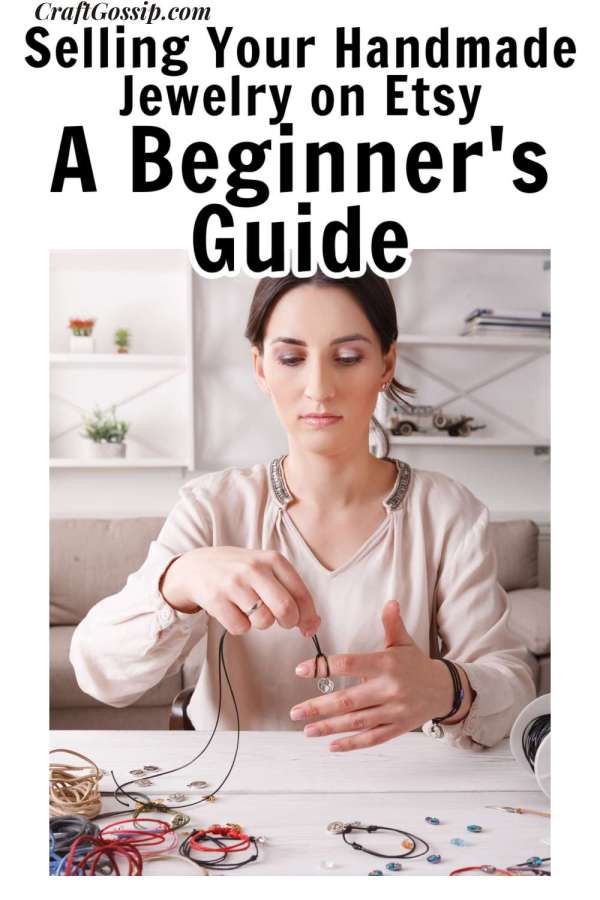
Are you a creative soul with a knack for crafting beautiful jewelry? Are you itching to turn your passion into a thriving business? Well, Etsy might just be your answer. Welcome to “Selling Your Handmade Jewelry on Etsy: A Beginner’s Guide.” This article will be your compass, guiding you through the exciting journey of starting your own handmade jewelry store on the world’s most popular handmade marketplace.
Before you embark on your Etsy adventure, you need to make a grand entrance. Your brand name is your storefront’s identity, and it can make or break a first impression. Think carefully about your brand name; it should reflect your style and be memorable. Quirky, elegant, or personal—your name should resonate with you and your creations.
Jewelry making is an art, and when you’re selling your creations, pricing becomes a pivotal point. You don’t want to undercharge and lose out on potential profit, but you also don’t want to overprice and scare away potential buyers. Consider factors like the cost of materials, your time and labor, and other overhead expenses when setting your prices. Be competitive but don’t undervalue your craft.
They say a picture is worth a thousand words, and on Etsy, that couldn’t be truer. High-quality, well-lit, and beautifully composed photographs can make or break a sale. Invest in a good camera or smartphone with an excellent camera, and use natural light to showcase your creations. Close-up shots highlighting intricate details and lifestyle shots showing your jewelry in use can be incredibly compelling.
Your listing description should be a blend of storytelling and practical information. Tell your potential customers about the inspiration behind your pieces, the materials used, and the love you put into each creation. Use relevant keywords in your title and description to improve your search ranking on Etsy. This is how buyers will find your products, so choose your words wisely.
Etsy offers several tools to make your selling journey smoother. Take advantage of the Etsy Seller app for on-the-go updates, manage your inventory with ease, and offer promotions to attract more customers. The “Shop Updates” feature can also keep your store fresh and engaging.
Social media is your best friend when it comes to marketing your Etsy store. Share your creations on platforms like Instagram, Facebook, and Pinterest to attract a wider audience. Consider running paid ads on these platforms to reach even more potential customers. Building a community and engaging with your customers can go a long way in establishing trust and loyalty.
Don’t neglect the practical aspects of your business. Ship your products promptly and securely, and be responsive to customer inquiries and concerns. A positive buying experience can lead to repeat business and glowing reviews.
Starting your handmade jewelry business on Etsy is an exciting adventure that can be financially rewarding and personally fulfilling. It’s a journey that combines your creative talents, business acumen, and a love for craftsmanship. Remember to adapt and evolve as your business grows, and most importantly, have fun along the way!
In this beginner’s guide, we’ve touched on essential aspects of selling your handmade jewelry on Etsy, including setting up your brand, pricing, photography, and marketing. With determination, creativity, and a sprinkle of marketing magic, you’re well on your way to success in the world of handmade jewelry on Etsy.
3 Things To Help Your Jewelry Business Succeed
Book Review Monday: How To Start A Home-Based Jewelry Making Business
How To Make Your Own Sea Glass
Here’s a legal checklist for selling your own jewelry:
Business Structure:
Determine your business structure (sole proprietorship, LLC, corporation, etc.) and register it with the appropriate authorities.
Obtain any required business licenses or permits for your jurisdiction.
Sales Tax:
Register for a sales tax permit with your state’s tax authority.
Understand the sales tax regulations in your area and collect sales tax on applicable sales.
EIN (Employer Identification Number):
If your business is not a sole proprietorship, apply for an EIN from the IRS for tax purposes.
Business Name:
Check the availability of your business name and register it as a trade name or trademark if needed.
Product Compliance:
Ensure that your jewelry complies with safety and material regulations (e.g., lead content, nickel allergies) and labeling requirements.
Copyright and Trademarks:
If you create unique designs or logos, consider copyright and trademark protection for your brand and designs.
Privacy and Data Protection:
Develop a privacy policy if you collect customer information and comply with data protection laws, such as GDPR (if applicable).
Product Liability Insurance:
Consider obtaining product liability insurance to protect your business in case of injury or harm caused by your products.
Contract Terms and Conditions:
Create terms and conditions of sale to define your return policy, warranty, and other important details.
Online Sales:
If you’re selling online, comply with e-commerce regulations and protect customer data. Understand distance selling rules, if applicable.
Shipping and Packaging:
Comply with shipping regulations and label your packages properly. Consider international shipping requirements.
Import and Export Regulations:
If you source materials or sell internationally, be aware of import and export regulations, including customs and tariffs.
Business Permits:
Check local zoning regulations to ensure you can operate your business from your location.
Environmental Regulations:
Comply with any environmental regulations related to your production processes, especially if you work with hazardous materials.
Lawsuits and Dispute Resolution:
Develop a strategy for handling potential disputes or legal issues, including arbitration or mediation clauses in contracts.
Consumer Protection Laws:
Understand and comply with consumer protection laws and advertising regulations in your area.
Employee Regulations:
If you hire employees, familiarize yourself with labor laws, minimum wage laws, and workplace safety requirements.
Accounting and Taxes:
Keep meticulous records of your income and expenses. Consult with an accountant or tax professional to ensure you meet your tax obligations.
Customer Reviews and Testimonials:
Ensure that any customer reviews and testimonials on your website or social media are truthful and comply with advertising regulations.
Legal Consultation:
Consult with an attorney who specializes in business law to ensure you’re complying with all relevant legal requirements.
Remember that legal requirements can vary significantly depending on your location and the nature of your jewelry business. It’s crucial to conduct thorough research and seek professional advice to ensure full legal compliance as you start and operate your jewelry business.




